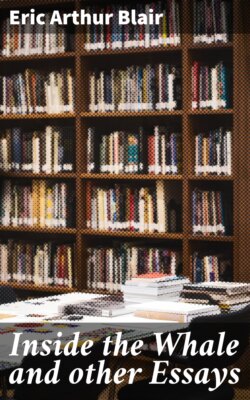Inside the Whale and other Essays

Реклама. ООО «ЛитРес», ИНН: 7719571260.
Оглавление
Eric Arthur Blair. Inside the Whale and other Essays
Inside the Whale and other Essays
Table of Contents
BIBLIOGRAPHICAL NOTE
INSIDE THE WHALE
II
III
DOWN THE MINE
ENGLAND YOUR ENGLAND. I
II
III
IV
V
VI
SHOOTING AN ELEPHANT
LEAR, TOLSTOY AND THE FOOL
POLITICS vs LITERATURE: An Examination of Gulliver's Travels
POLITICS AND THE ENGLISH LANGUAGE
THE PREVENTION OF LITERATURE
BOYS' WEEKLIES
Отрывок из книги
Eric Arthur Blair
Published by Good Press, 2021
.....
The mental connexion between pessimism and a reactionary outlook is no doubt obvious enough. What is perhaps less obvious is just why the leading writers of the twenties were predominantly pessimistic. Why always the sense of decadence, the skulls and cactuses, the yearning after lost faith and impossible civilizations? Was it not, after all, because these people were writing in an exceptionally comfortable epoch? It is just in such times that 'cosmic despair' can flourish. People with empty bellies never despair of the universe, nor even think about the universe, for that matter. The whole period 1910-30 was a prosperous one, and even the war years were physically tolerable if one happened to be a non-combatant in one of the Allied countries. As for the twenties, they were the golden age of the rentier-intellectual, a period of irresponsibility such as the world had never before seen. The war was over, the new totalitarian states had not arisen, moral and religious tabus of all descriptions had vanished, and the cash was rolling in. 'Disillusionment' was all the fashion. Everyone with a safe £500 a year turned highbrow and began training himself in taedium vitae. It was an age of eagles and of crumpets, facile despairs, backyard Hamlets, cheap return tickets to the end of the night. In some of the minor characteristic novels of the period, books like Told by an Idiot, the despair-of-life reaches a Turkish-bath atmosphere of self-pity. And even the best writers of the time can be convicted of a too Olympian attitude, a too great readiness to wash their hands of the immediate practical problem. They see life very comprehensively, much more so than those who come immediately before or after them, but they see it through the wrong end of the telescope. Not that that invalidates their books, as books. The first test of any work of art is survival, and it is a fact that a great deal that was written in the period 1910-30 has survived and looks like continuing to survive. One has only to think of Ulysses, Of Human Bondage, most of Lawrence's early work, especially his short stories, and virtually the whole of Eliot's poems up to about 1930, to wonder what is now being written that will wear so well.
But quite suddenly, in the years 1930-5, something happens. The literary climate changes. A new group of writers, Auden and Spender and the rest of them, has made its appearance, and although technically these writers owe something to their predecessors, their 'tendency' is entirely different. Suddenly we have got out of the twilight of the gods into a sort of Boy Scout atmosphere of bare knees and community singing. The typical literary man ceases to be a cultured expatriate with a leaning towards the Church, and becomes an eager-minded schoolboy with a leaning towards Communism. If the keynote of the writers of the twenties is 'tragic sense of life', the keynote of the new writers is 'serious purpose'.
.....